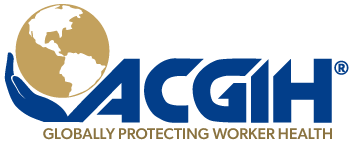- About
-
-

- About
-
ACGIH is a 501(c)(3) charitable scientific organization that advances occupational and environmental health.
-
-
- Subscriptions
-
- Science
-
-

- Science
-
This section has been established to help educate industry, government, and the public on what TLVs and BEIs are, and how TLVs and BEIs may best be used.
-
-
- Career Development
-
-

- Career Development
-
ACGIH is committed to providing its members and other occupational and environmental health professionals with the training and education they need to excel in their profession.
-
-
- Publications
-
-

- Publications
-
ACGIH has publications in many different areas that fit your needs in your field.
-
- Publications Store
- ACGIH Signature Publications
ACGIH Digital Library
If you need to purchase the Digital Library, click here.
If you have purchased and need to access the Digital Library, click here.
-
-
Author Guidelines
This guide highlights resources and services for ACGIH authors. For a complete information, please refer to the Technical Style Guide for ACGIH Publications.
Author Resources
ACGIH provides authors with resources to support the writing process. Please contact the Technical Editor, the Scientific Process and Research Manager, or your committee liaison if you need assistance or have issues downloading any files.
Committee Operations Manual and Handbooks
Technical Style Guide for ACGIH Publications
Endnote Manual for ACGIH Publications
ACGIH Citation Style for Endnote
BEI Long Feasibility Assessment Template and Guidelines
BEI Short Feasibility Assessment Template and Guidelines
Research Services
Literature Searches
In collaboration with the authors, the ACGIH Scientific Process and Research Manager will conduct all literature searches. This method allows for consistency, considers ease of updating, and creates an essential record of search strategies.
Article Requests
Authors may request a copy of an article they cannot access by contacting the ACGIH Scientific Process and Research Manager.
Copyright Permissions
If an author would like to use an image or table that originated from another source, please reach out to the ACGIH Scientific Process and Research Manager to begin the process of acquiring permission. It is best to obtain permission at the beginning of the writing process.
If non-peer-reviewed or unpublished materials are necessary references, the author using them is expected to provide a copy of these materials to ACGIH upon completion of their drafts. If unpublished data are used, the owner must first provide ACGIH written permission to use, cite, and release the data/report to an outside party upon request.
Translations of References
In the case of translated information, care must be taken to ensure the information has been correctly interpreted. Translation of non-English sources may be possible if the study is critical to a publication. The need for such translation should be discussed with the appropriate Chair for review and recommendation to the ACGIH staff for approval. Copies of any translations should be sent to the ACGIH Staff.
Editing Services
English Language Editing
The Technical Editor will review all publications to ensure that they meet the standards of scholarly English writing and are free of grammatical, spelling, and other common language errors.
Scientific Editing
An in-depth evaluation of ACGIH publications is performed by the Technical Editor, who offers advice on the strength and positioning of the research argument to help our authors deliver comprehensive, well-articulated publications.
Manuscript Formatting
ACGIH-provided templates should be used for all Documentation and are available on Sharefile. Authors of other types of publications should consult with the Technical Editor for formatting options. The Technical Editor will review all publications to ensure consistency within and between each publication type.
Citation Style and References
Cited references should result from a rigorous process that ensures the author adequately vetted all cited sources. If an author believes that information is important enough to include in a publication, it is equally important to review the original source of that information.
Primary resources for ACGIH style are the Council of Science Editors (CSE) and Chicago Manual of Style’s (CMS) Scientific Style and Format (8th Edition). Recommendations for the Conduct, Reporting, Editing, and Publication of Scholarly Work in Medical Journals (ICMJE Recommendations) and the Guide for the Use of the International System of Units by NIST are used as subject-specific sources.
ACGIH uses the citation-sequence system with reference numbers as superscripts.
Authors are also strongly encouraged to use a bibliographic software tool to facilitate sharing of source information with staff and improve efficiency for any publication. ACGIH utilizes Endnote; authors may download and use the Endnote style file from Sharefile.
Plagiarism and Originality
It is ACGIH’s policy only to consider original works that are not under consideration for any other publication. All authors are expected to present their work in their own words. If authors have any questions about understanding acceptable and unacceptable practices, please contact the Scientific Process and Research Manager or Technical Editor.
Data Availability
Authors should retain published or unpublished data for a minimum of 3 years. As with unpublished materials, the author using unpublished data is expected to provide a copy of these materials to ACGIH upon completion of their drafts. The owner must first provide ACGIH written permission to use, cite, and release the data/report to an outside party upon request.
Submission Guidelines
Submission Process
All publications will go through the following process:
- The volunteer author and ACGIH’s Scientific Process and Research Manager collaborate on the literature review supporting the draft.
- The volunteer author drafts the publication.
- Publications are passed to staff for review, including reference checking. If volunteer authors use a bibliographic software manager, please pass along any .ris or other bibliographic file(s) to staff.
- Publications are edited by staff.
- Publications are returned to the author with comments and queries, if any.
- The author responds to queries and returns the revised publication to staff.
- Staff respond to queries and make final changes. The final version can be sent on the author’s request with all changes made and queries answered, but it is unnecessary.
The process is designed for staff to assist the volunteer authors as much as possible while promoting efficiency, consistency, and accountability.
File Formats
Authors should submit publications as DOCX files.
Figures, tables, and other graphics should be submitted separately as PNG, EPS, or PDF files; these should also be at least 300 DPI. Authors may indicate where figures, tables, or other graphics appear in the publication by placing them in the file or indicating to “Insert Figure x here.”
For tables, it is preferable to send ACGIH staff the data file, such as an Excel document, used to create the table.
Publication Timeline
Once a publication is submitted to staff for proofing, return is dependent on the following:
- Length of Documentation
- A 7-page document with 5 primary sources and 11 indirect sources will take less time than a 38-page document with 44 primary sources. Staff review, create the bibliography, and verify citations at this stage.
- Length of other publications
- There are currently no page limits on the length of books, book chapters, or monographs. White papers should be limited to 30 pages, including references.
- Format of reviewed publications
- Publications will be sent back as a Word file with track changes showing and comments in the sidebar. Authors will have to make changes and responses using the version emailed to them, not a prior version.
- Query response
- An author will have a maximum of 14 days to respond to queries and is welcome to email staff at any point with questions or for help parsing requests. Staff would like only 2 rounds of this cycle. A quicker turnaround than 2 weeks is appreciated as this allows for timely publication.
- If the author is in a bind
- We understand and appreciate the amount of time spent and the level of detail volunteers provide when writing publications. If an author does not have time for the query stage or only has time for an initial pass regardless of remaining open queries, staff retains the right to make all changes necessary. These changes may include the following:
- Removing citations that cannot be verified.
- Removing or replacing figures that cannot be sourced or are copyrighted.
- Editing the text for clarity and consistency.
- We understand and appreciate the amount of time spent and the level of detail volunteers provide when writing publications. If an author does not have time for the query stage or only has time for an initial pass regardless of remaining open queries, staff retains the right to make all changes necessary. These changes may include the following:
Errors
While the Editorial Team does its best to ensure that each publication goes to press error-free, sometimes mistakes happen. If you see an error, contact the Technical Editor with the publication name, page number, and a description of the error.
Enjoy exclusive benefits including free and discounted publications, conferences and continuing education courses – all while supporting the TLVs® and BEIs®.






